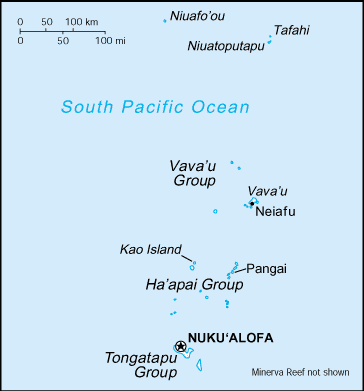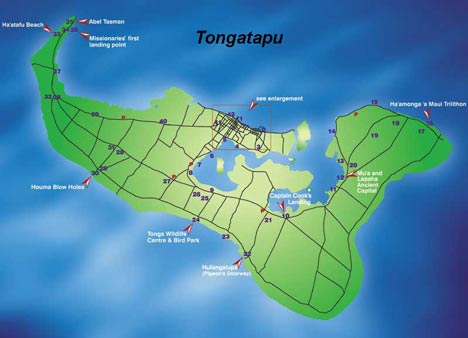Across Pacific & Asia
Background:
 The archipelago of "The Friendly Islands" was united into a Polynesian kingdom in 1845. It became a constitutional monarchy in 1875 and a British protectorate in 1900. Tonga acquired its independence in 1970 and became a member of the Commonwealth of Nations. It remains the only monarchy in the Pacific. Population:
112,422 (July 2005
est.)
Comparative area: four times the size of Washington, DC Climate: tropical; modified by trade winds; warm season (December to May), cool season (May to December) Economy
- overview:
Tonga, a small, open, South Pacific island economy, has a small export base in agricultural goods. Squash, coconuts, bananas, and vanilla beans are the main crops, and agricultural exports make up two-thirds of total exports. The country must import a high proportion of its food, mainly from New Zealand. Tourism is the second largest source of hard currency earnings following remittances. The country remains dependent on external aid and remittances from Tongan communities overseas to offset its trade deficit. The government is emphasizing the development of the private sector, especially the encouragement of investment, and is committing increased funds for health and education. Tonga has a reasonably sound basic infrastructure and well-developed social services. High unemployment among the young, a continuing upturn in inflation, pressures for democratic reform, and rising civil service expenditures are major issues facing the government.  Import partners:
New Zealand 37.1%, Fiji 24.3%, Australia 9.1%, China 8.9%, US 6.3%
(2004) Import partners:
New Zealand 37.1%, Fiji 24.3%, Australia 9.1%, China 8.9%, US 6.3%
(2004)Export partners: Japan 37.1%, China 18.7%, US 17.7%, Taiwan 8.7%, New Zealand 7.4% (2004) Economic aid: Australia $5.5 million, New Zealand $2.3 million (FY01/02)
HistoryPolynesians have lived on Tonga for about 3,000 years. The Dutch were the first to explore the islands, landing on Tafahi in 1616. British explorer James Cook landed on islands in 1773 and 1777 and dubbed them the Friendly Islands. The current royal dynasty of Tonga was founded in 1831 by Taufa'ahau Tupou, who took the name George I. He consolidated the kingdom by conquest and in 1875 granted a constitution. In 1900, his great-grandson, George II, signed a treaty of friendship with Britain, and the country became a British protected state. The treaty was revised in 1959. Tonga became independent on June 4, 1970. The government is largely controlled by the king, his nominees, and a small group of hereditary nobles. In the 1990s a movement began aimed at limiting the powers of the monarchy, and the Tongan Pro-Democracy Movement (TPDM) has continued to gain in popular support. In 1999, Tonga gained UN membership. The king's official court jester, American Jesse Bogdonoff, a former salesman of magnets to relieve back pain, was sued by the government in 2002 for squandering $26 million of Tonga's money (40% of its annual revenue) in unsound investment schemes. In 2004, he agreed to pay a $1 million settlement. The king
celebrated his 85th birthday in 2003. He has grown increasingly
authoritarian and has curtailed press freedom. In July and August 2005,
about 3,000 civil servants went on strike, demanding better pay.
Throughout
2005, discontent with economic and social inequities grew throughout
the kingdom. Source: http://www.infoplease.com current local TIME in Tonga
|
| .......................................................................... |
.. |
...........................
.............................................................. .................
|
| ........ |
..............................Building Bridges ACROSS the Barriers.................................... .............................................................................. |
........ |


